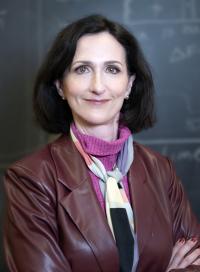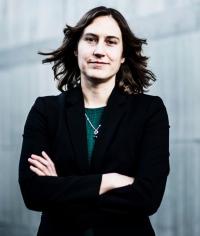Lecturers from 2018 to the present
2024

Sara Seager is an astrophysicist and a professor of physics, professor of planetary science, and professor of aeronautics and astronautics at MIT, where she holds the Class of 1941 Professor Chair. She has been a pioneer in the vast and unknown world of exoplanets, or planets that orbit stars other than the sun. Her groundbreaking research ranges from the foundation of exoplanet atmospheres to innovative theories about life on other worlds to development of novel space mission concepts.
In space missions for planetary discovery and exploration, she was the deputy science director of the MIT-led NASA Explorer-class mission TESS; was principal investigator of the Jet Propulsion Lab–MIT CubeSat ASTERIA; and is a lead of the starshade mission concepts to find a true Earth analog orbiting a sunlike star. Currently she leads the Morning Star Missions to Venus, a series of small, focused missions to find signs of life or life itself in Venus’ atmosphere.
Her research earned her a MacArthur Foundation “genius grant” and many other accolades, including membership in the US National Academy of Sciences; the Kavli Prize in Astrophysics; and one of Canada’s highest civilian honors, appointment as an Officer of the Order of Canada. Seager is the author of The Smallest Lights in the Universe: A Memoir.

Elizabeth A. Stuart is the Frank Hurley and Catharine Dorrier Chair and Bloomberg Professor of American Health in the Department of Biostatistics at the Johns Hopkins Bloomberg School of Public Health, with joint appointments in the Department of Mental Health and the Department of Health Policy and Management.
A statistician by training, her research interests are in design and analysis approaches for estimating causal effects in experimental and nonexperimental studies, including questions around the external validity of randomized trials and the internal validity of nonexperimental studies. Her recent interests include combining data sources to assess treatment effect heterogeneity and methods for evidence synthesis. She has extensive experience with the application of causal inference methods in education, the social sciences, and public health, particularly mental health, substance use, and state policy evaluation.
She has received research funding for her work from the National Science Foundation, the Institute of Education Sciences, the William T. Grant Foundation, and the National Institutes of Health, and she has served on advisory panels for the National Academy of Sciences, the U.S. Department of Education, and the Patient-Centered Outcomes Research Institute. She has received the mid-career award from the Health Policy Statistics Section of the American Statistical Association, the Gertrude Cox Award for applied statistics, Harvard University’s Myrto Lefkopoulou Award for excellence in biostatistics, and the Society for Epidemiologic Research’s Marshall Joffe Epidemiologic Methods Research Award.
Johns Hopkins scientist, Elizabeth Stuart, to present spring 2024 SAGF lecture
2023

Biochemist and Nobel Prize-winning co-inventor of CRISPR technology Jennifer Doudna will present the fall 2023 Science Achievement Graduate Fellows (SAGF) Lecture on Monday, October 23, at 4 p.m. This free online public lecture, titled “A decade of CRISPER: What's ahead for genome editing,” is sponsored by the Penn State Eberly College of Science with funds the Russell E. Marker Lecture endowment.
Fundamental research to understand how bacteria fight viral infections uncovered the function of CRISPR-Cas programmable proteins that detect and cut specific DNA or RNA sequences. Doudna will describe their research showing how CRISPR-Cas9, an RNA-guided protein, is the foundation of widely accessible technology for genome editing. Current research focuses on exploring the biochemical basis for genome editing and developing effective applications in medicine and agriculture. Recent results show how CRISPR-Cas9 “reads” the genome to find target sequences quickly and accurately. These findings are the foundation of strategies to use CRISPR-based genome editing in new ways, including to study the biology of microbial communities such as the human gut microbiome.

Theoretical astrophysicist and popular science writer Katie Mack will present the spring 2023 Science Achievement Graduate Fellows (SAGF) Lecture on Monday, January 23, at 1 p.m. in the Paterno Library's Foster Auditorium on the Penn State University Park campus. This free public lecture, titled “Physics at the End of the Universe,” is sponsored by the Penn State Eberly College of Science with funds the Russell E. Marker Lecture endowment.
Mack’s lecture will share what modern astrophysics predicts about the ultimate fate of the universe and what its destruction might look like. An informal reception will follow the talk in 321 Whitmore Lab.
Mack is a theoretical astrophysicist who currently holds the Hawking Chair in Cosmology and Science Communication at the Perimeter Institute for Theoretical Physics in Canada. Her research explores a range of questions in cosmology—the study of the universe from beginning to end—including those related to dark matter and the early universe. She is also interested in making physics more accessible to the general public and recently authored the book “The End of Everything (Astrophysically Speaking).” She has written for a number of popular publications, such as Scientific American, Slate, Sky & Telescope, Time, and Cosmos magazine, and can be found on twitter as @AstroKatie.
2021

Mathematician Maria Chudnovsky presented the fall 2021 Science Achievement Graduate Fellows (SAGF) Lecture on Monday, November 1, 2021.
Chudnovsky received both her bachelor’s and master’s degrees from Technion Israel Institute of Technology, and a doctoral degree from Princeton University. She was a Liu Family Professor of Industrial Engineering and Operations Research at Columbia University, a Clay Mathematics Institute research fellow, and a Veblen Research Instructor at Princeton and the Institute for Advanced Study. Chudnovsky is an editorial board member of the Journal of Graph Theory, the Journal of Computer and System Sciences, and the Society for Industrial and Applied Mathematics journal Discrete Mathematics. She was a part of the team that proved the strong perfect graph theorem, a 40-year-old conjecture that had been a well-known open problem in both graph theory and combinatorial optimization. For this work the team was awarded the prestigious Fulkerson prize in 2009. In 2010, Chudnovsky was named one of the "brilliant ten" young scientists by Popular Science magazine. In 2012, she received a MacArthur Foundation Fellowship and in 2014 she was an invited speaker at the International Congress of Mathematicians. Today, Chudnovsky is a mathematics professor at Princeton University.

Geologist Jane Willenbring presented the spring 2021 Science Achievement Graduate Fellows Lecture on February 10, 2021.
Jane Willenbring is an associate professor of geological sciences at Stanford University. Willenbring’s research examines the evolution of the Earth’s surface, especially how landscapes are affected by tectonics, climate change, and life. She also organizes environmental justice campaigns around urban soil pollution and does outreach to help reduce sexual harassment and discrimination in science, technology, engineering, and mathematics (STEM). She is the recipient of the Antarctica Service Medal from the US Armed Forces, a National Science Foundation CAREER Award and Marguerite T. Williams award, and a Presidential Citation from the American Geophysical Union. Willenbring is a Fellow of the Geological Society of America and a Gabilan Fellow at Stanford University. She is one of the scientists featured in the film Picture a Scientist.
2019

Yvonne Buckley, professor of zoology at Trinity College Dublin, presented the fall 2019 Science Achievement Graduate Fellows (SAGF) Lecture on Tuesday, October 29, 2019.
Yvonne Buckley focuses her research on understanding the fundamental drivers of how animal and plant populations cope with a rapidly changing world. She combines data collected in the lab, in the field, and from existing literature with quantitative modelling to predict the responses of populations to changes in their environment. Buckley’s research provides support for environmental policies that impact biodiversity conservation, invasive species management, and habitat restoration.
Buckley meets SAGF fellows visits local high school scientists

Astrophysicist Jocelyn Bell Burnell, winner of the 2018 Special Breakthrough Prize in Fundamental Physics, presented the srping 2019 Science Achievement Graduate Fellows (SAGF) Lecture at Penn State.
Since the 1960s, Bell Burnell has actively taken strides in furthering the education and research of astronomy. She has served as president of the Royal Astronomical Society as well as the first female president of both the Institute of Physics and the Royal Society of Edinburgh. Bell Burnell is currently a visiting professor of astrophysics at the University of Oxford, professorial fellow in physics at Mansfield College, Oxford, and chancellor of the University of Dundee.
2018

Alicia Carriquiry, distinguished professor of statistics and director of the Center for Statistics and Applications in Forensic Evidence at Iowa State University, presented the inaugural Science Achievement Graduate Fellows (SAGF) Lecture.
Alicia Carriquiry researches applications of statistics in human nutrition, bioinformatics, forensic sciences, and traffic safety and has published more than 100 peer-reviewed articles in corresponding academic journals.
Inaugural Science Achievement Graduate Fellows (SAGF) Lecture